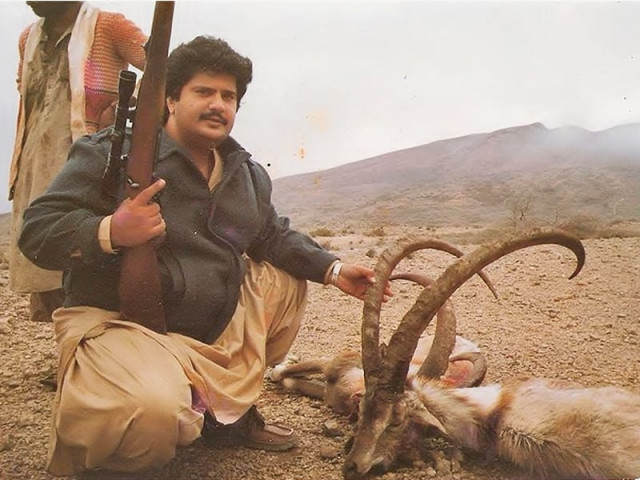Karachi Conference: Stop ganging up on Lyari
Experts share histories, analysis of what this neighbourhood says about itself and the rest of Karachi.

Nabeel Gabol, whose family is a strong political force in Lyari, is pictured on a hunting expedition of a rare species of deer, the Sindh Ibex, in his ancestral village, Baran. IMAGE: WIKIPEDIA
Whether you are Baloch or Kutchi, Mohajir or Pathan - you are who you know in Lyari.
Adeem Suhail tells the story of a young man and a woman who worked in an NGO in the neighbourhood of Uzair Jan Baloch, the chief of the Peoples Amn Committee. “When they left the area on a motorcycle one day the gang members stopped them on suspicion that they were ‘informers’ for the Rangers,” Suhail said. The young man had to ask a well-connected cousin to bail them out. But then, after they exited Lyari they were stopped by the Rangers when they reached Kharadar. The Rangers accused them of abetting the gang members. Again, the cousin had to bail them out.
This anecdote was presented by Suhail at the first Karachi conference on Sunday during his talk on Lyari. He used the story to draw parallels between the gangsters and Rangers - both use coercive powers. They both behaved like the State. “But [the state] is not a qila [fort] that one has to conquer,” he stressed. The lines between legal and illegal are also blurred. One group subjugates others but has to conceal that they have done so as well.
It is small wonder then, that fear abounds in Lyari. Nida Kirmani spoke of three entities that elicited fear in the neighbourhood: the gang conflict, the state and the Muttahida Qaumi Movement. The ethnic violence in 2010 and 2011 between Baloch and Mohajirs, when scores of innocent people died on both sides, fuelled this.
But people she interviewed also feared the police and Rangers. “The police operation under Chaudhry Aslam brought people together,” she said. “The fear of Rangers and police is a major one as well. They say ‘Humen ab ziyada dar police se lagta hay’.”
The people are also afraid of the gang war. “No, we are afraid. We are afraid even in our homes,” she quoted an interviewee as saying. “When the situation is bad outside, we don’t go out. When one knows the situation is bad outside, why should one go out?” The only silver lining is that the presence of the gangsters has reduced theft in the area. “If someone is caught stealing, then they catch them and beat them like animals.”

Posters of Uzair Baloch and Rahman ‘Dakait’ hanging from a building in Lyari. IMAGE: DR LAURENT GAYER
Thus, Lyari’s people have been marginalized, demographically, politically and economically. Dr Laurent Gayer presented a historical perspective on the politics and patronage of violent actors in the neighbourhood. “Lyari is largely perceived as the area of Baloch,” he said but many different types of people live there, not just Baloch or ‘sheedis’. Of course, the British and subsequent governments have all neglected this part of the city. Ironically, though, the powerful have had long relationships with the ‘criminal’ in order to hold sway over the town.
The Haroon and Gabol families have dominated Lyari, pointed out Gayer. For example, Dadal and Sheru, the father and uncle of Rehman ‘Dakait’, were enlisted to provide security for Ayub Khan’s meetings in Karachi.
Indeed, Dr Akhtar Baloch, one of the panelists said: “We forget the reasons behind the criminal activities and marginalization in Lyari. They are lower class people, workers and ready to accommodate everyone… Ayub Khan, Zia ‘Khan’ and Bhutto ‘Khan’ - they all patronized criminals.” In answer to a question from the audience, Dr Kirmani repeated Dr Baloch’s point: “There is a link between the PPP and gangsters. Yes, criminals need protection, therefore, they need support of the politicians.”
Eventually, it was men like Rehman who wanted to wrest power from these “moaziz gharanas” or notables, for themselves. In 2008, Rehman declared himself a sardar in order to legitimize his power. He was killed a year later.
But no matter what who was in power, Lyari’s marginalization persisted. The reduction of the son quota from companies, including the Karachi Port Trust, had a negative impact. “They don’t get jobs and admission in educational institutions because they are from Lyari,” Nida Kirmani added.
Though the speakers spoke extensively on many aspects of Lyari they were hit by an onslaught of questions from the audience. What are the solutions, was the most pressing question. It was perhaps lost on those who asked it that the papers that were presented had all dwelt on solutions by simply examining the evidence in Lyari. It was almost disheartening that many of the questions, especially the ones on the exclusion or inclusion of a particular ethnic group, were asked by people who had not understood the experts.
In particular, Dr Wahab Suri’s dense presentation on the ‘Emergence of a Liberal Discourse in Post-Colonial Pakistan’ may have been hard to digest because of its hardcore theoretical content - but it carried the most important messages in a way.
He said: “Postcolonial societies oscillate between two fears: being left behind and being dominated and defining ourselves in negation.” He held up a mineral water bottle to prove his point. You can say it is a mineral water bottle, he said. Or you can say what it is not - that is, define it in negation. It is NOT a car, it is NOT a desk. But there is no point in getting sucked into that black hole.
Published in The Express Tribune, November 4th,2013.



















COMMENTS
Comments are moderated and generally will be posted if they are on-topic and not abusive.
For more information, please see our Comments FAQ